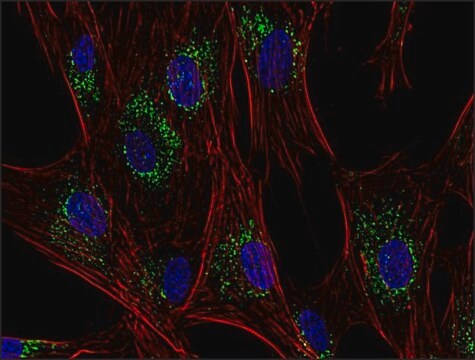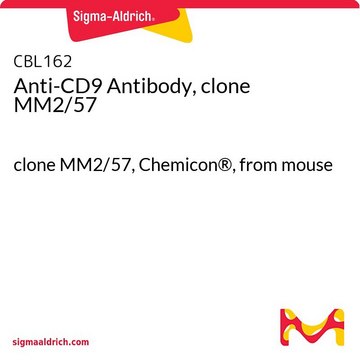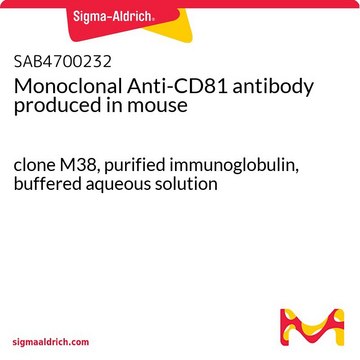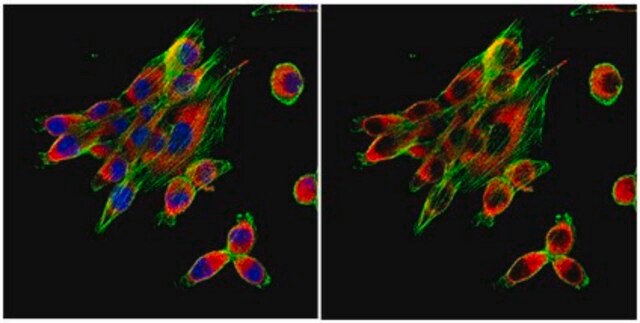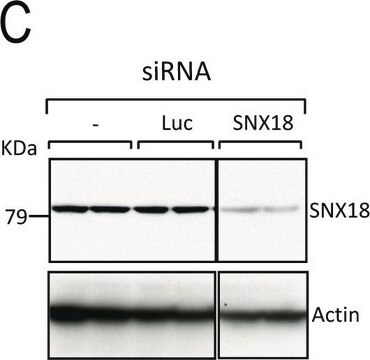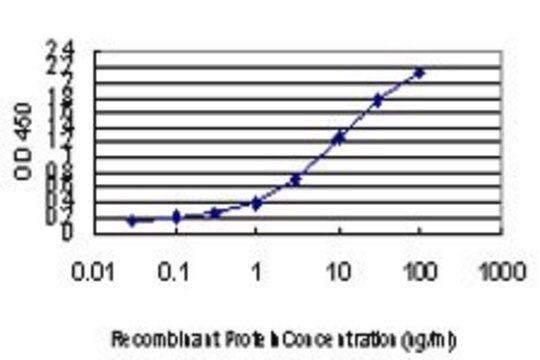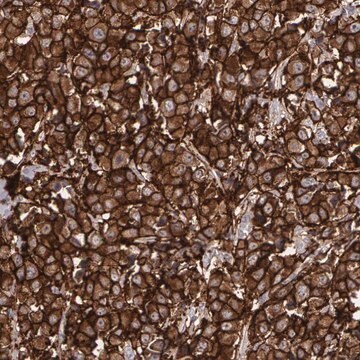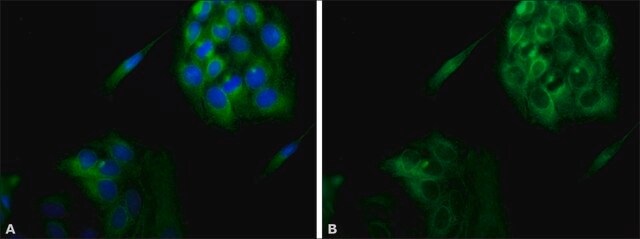SAB4700092
Monoclonal Anti-CD9 antibody produced in mouse
clone MEM-61, purified immunoglobulin, buffered aqueous solution
Faça loginpara ver os preços organizacionais e de contrato
About This Item
Código UNSPSC:
12352203
NACRES:
NA.41
Produtos recomendados
fonte biológica
mouse
Nível de qualidade
conjugado
unconjugated
forma do anticorpo
purified immunoglobulin
tipo de produto de anticorpo
primary antibodies
clone
MEM-61, monoclonal
Formulário
buffered aqueous solution
reatividade de espécies
human
concentração
1 mg/mL
técnica(s)
flow cytometry: suitable
Isotipo
IgG1
nº de adesão NCBI
nº de adesão UniProt
Condições de expedição
wet ice
temperatura de armazenamento
2-8°C
modificação pós-traducional do alvo
unmodified
Informações sobre genes
human ... CD9(928)
Descrição geral
CD9 (cluster of differentiation 9) is a human cell surface antigen. CD9 gene contains 8 exons extending over a length of 20kb on genomic DNA.The gene is mapped to human chromosome 2q12-pter. The encoded protein has a molecular weight of 24kDa and is expressed mainly on B-lineage-derived acute lymphoblastic leukemia cells and developing B lymphocytes.The protein is also present in blood platelets, neuroblastoma cell lines, normal and transformed epithelia, peripheral glia and neurons. CD9 antigen belongs to the transmembrane 4 superfamily (TM4SF) and is characterized with two external loops and four hydrophobic domains of membrane-spanning length.
Imunogênio
Pre-B cell line NALM-6
Aplicação
The reagent is designed for Flow Cytometry analysis. Suggested working dilution for Flow Cytometry is 5 μg/mL of sample. Indicated dilution is recommended starting point for use of this product. Working concentrations should be determined by the investigator.
Ações bioquímicas/fisiológicas
Members of transmembrane 4 superfamily (TM4SF) including CD9 (cluster of differentiation 9) plays a vital role in cell proliferation, activation, motility and tumor cell metastasis. CD9 facilitates platelet activation and aggregation. The encoded protein also plays a major role in the amplification of a motorgenic signal in B cells includingβ1 integrins and the activation of protein tyrosine kinases. CD9 interacts with GM3 and downregulates tumor cell motility. CD9 and CD81 stimulate muscle cell fusion and aids in myotube maintenance.
Características e benefícios
Evaluate our antibodies with complete peace of mind. If the antibody does not perform in your application, we will issue a full credit or replacement antibody. Learn more.
forma física
Solution in phosphate buffered saline, pH 7.4, with 15 mM sodium azide.
Exoneração de responsabilidade
Unless otherwise stated in our catalog or other company documentation accompanying the product(s), our products are intended for research use only and are not to be used for any other purpose, which includes but is not limited to, unauthorized commercial uses, in vitro diagnostic uses, ex vivo or in vivo therapeutic uses or any type of consumption or application to humans or animals.
Não está encontrando o produto certo?
Experimente o nosso Ferramenta de seleção de produtos.
Código de classe de armazenamento
10 - Combustible liquids
Ponto de fulgor (°F)
Not applicable
Ponto de fulgor (°C)
Not applicable
Escolha uma das versões mais recentes:
Já possui este produto?
Encontre a documentação dos produtos que você adquiriu recentemente na biblioteca de documentos.
Ectopic expression of human and feline CD9 in a human B cell line confers beta 1 integrin-dependent motility on fibronectin and laminin substrates and enhanced tyrosine phosphorylation.
Shaw AR
The Journal of Biological Chemistry, 270, 24092-24099 (1995)
GM3 ganglioside inhibits CD9-facilitated haptotactic cell motility: coexpression of GM3 and CD9 is essential in the downregulation of tumor cell motility and malignancy.
Ono M
Biochemistry, 40, 6414-6421 (2001)
Yibei Dai et al.
Frontiers in oncology, 11, 777684-777684 (2021-12-14)
Prostate cancer (PCa) is one of the most frequently diagnosed cancers and the leading cause of cancer death in males worldwide. Although prostate-specific antigen (PSA) screening has considerably improved the detection of PCa, it has also led to a dramatic
Mayela Mendt et al.
JCI insight, 3(8) (2018-04-20)
Exosomes are extracellular vesicles produced by all cells with a remarkable ability to efficiently transfer genetic material, including exogenously loaded siRNA, to cancer cells. Here, we report on a bioreactor-based, large-scale production of clinical-grade exosomes employing good manufacturing practice (GMP)
Assignment to chromosome 12 of the gene coding for the human cell surface antigen CD9(p24) using the monoclonal antibody ALB6.
Boucheix C
Annales De Genetique, 28, 19-24 (1985)
Nossa equipe de cientistas tem experiência em todas as áreas de pesquisa, incluindo Life Sciences, ciência de materiais, síntese química, cromatografia, química analítica e muitas outras.
Entre em contato com a assistência técnica